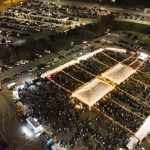Unlock The Spiritual Essence Of Shia Ramadan: Your Ultimate Guide To A Soulful Journey
Shia Ramadan: A Holistic Approach to Fasting
Introduction
Greetings, Ramadhan enthusiasts and lovers of this blessed month! As the holy month of Ramadhan approaches, it is essential to understand the various practices and beliefs followed by different Muslim communities. One such practice is Shia Ramadan, observed by Shia Muslims worldwide. In this article, we will explore the significance, traditions, and rituals associated with Shia Ramadan, providing a comprehensive understanding for all those seeking knowledge and insight into this sacred observance.
0 Picture Gallery: Unlock The Spiritual Essence Of Shia Ramadan: Your Ultimate Guide To A Soulful Journey
What is Shia Ramadan? 🌙
Shia Ramadan, also known as Ramzan, is the month-long fasting period observed by Shia Muslims, who belong to the Shia branch of Islam. This annual observance holds immense spiritual importance for Shia Muslims and is an integral part of their religious beliefs.
History and Significance
Image Source: twimg.com
Shia Ramadan commemorates the revelation of the Holy Quran to the Prophet Muhammad (peace be upon him) through the archangel Gabriel. It is a time for Shia Muslims to reflect on their faith, seek forgiveness, and engage in acts of charity and self-discipline.
Duration of Fasting
Similar to Sunni Ramadan, Shia Ramadan lasts for one lunar month, which is approximately 29 or 30 days. During this period, Shia Muslims abstain from food, drink, and other sensual pleasures from dawn until sunset.
Pre-Dawn Meal (Sahur)
Shia Muslims wake up early before sunrise to have a pre-dawn meal called Sahur. This meal is crucial as it provides sustenance for the day of fasting ahead. It is recommended to consume nutritious and energy-rich foods to ensure strength throughout the day.
Breaking the Fast (Iftar)
The fast is broken at sunset with a meal called Iftar. Shia Muslims traditionally break their fast with dates and water, following the example of the Prophet Muhammad (peace be upon him). The Iftar meal is usually a joyous occasion shared with family and friends.
Nightly Prayers (Taraweeh)
Shia Muslims engage in special nightly prayers called Taraweeh, which are performed after Isha prayers. These prayers consist of reciting verses from the Holy Quran and supplicating to Allah for forgiveness and blessings.
Commemoration of Ashura
During Shia Ramadan, special emphasis is placed on the commemoration of Ashura, which marks the martyrdom of Imam Hussein, the grandson of Prophet Muhammad (peace be upon him). Shia Muslims participate in mourning processions, recite elegies, and engage in acts of charity during this period.
Who Observes Shia Ramadan? 🕌
Shia Ramadan is observed by Shia Muslims worldwide. Shia Islam is the second-largest branch of Islam, comprising approximately 15-20% of the global Muslim population. Countries with significant Shia Muslim populations include Iran, Iraq, Lebanon, Bahrain, and Pakistan.
Shia Beliefs and Practices
Shia Muslims follow a distinct set of beliefs and practices that differ from their Sunni counterparts. They believe in the concept of Imamat, which refers to the leadership of divinely appointed Imams after the Prophet Muhammad (peace be upon him). These Imams hold a central role in guiding the Shia community spiritually and politically.
Shia Rituals during Ramadan
Shia Muslims engage in various rituals during Ramadan, such as holding gatherings for reciting the Quran, organizing religious lectures, and performing acts of charity. They also place a strong emphasis on mourning rituals during Ashura, which includes self-flagellation and reenactments of the Battle of Karbala.
When is Shia Ramadan Celebrated? ⏰
Shia Ramadan follows the sighting of the new moon, similar to other Islamic lunar months. The exact date of the month’s beginning can vary depending on the sighting of the moon in different regions. It is essential for Shia Muslims to rely on reliable Islamic authorities or local moon sighting committees to determine the start and end of the month.
Where is Shia Ramadan Celebrated? 🌍
Shia Ramadan is celebrated wherever Shia Muslim communities exist. It is observed in countries across the globe, including Iran, Iraq, Lebanon, Bahrain, Pakistan, India, and various Western countries with significant Shia populations. Mosques, community centers, and homes become centers for worship and communal activities during this holy month.
Why is Shia Ramadan Significant? ❓
Shia Ramadan holds immense significance for Shia Muslims due to its spiritual, social, and cultural impact. It allows them to strengthen their relationship with Allah, seek forgiveness, and reflect on their actions. It is also a time for communal solidarity and coming together as a Muslim community to support one another in acts of charity and worship.
How is Shia Ramadan Observed? ✨
Shia Ramadan is observed through strict fasting from dawn to sunset, engaging in acts of worship, and practicing self-discipline. Shia Muslims focus on reciting the Quran, engaging in supplication and remembrance of Allah, and performing good deeds throughout the month. Furthermore, they actively participate in mourning rituals during Ashura to honor Imam Hussein’s sacrifice.
Advantages and Disadvantages of Shia Ramadan
Advantages:
Enhanced Spirituality: Shia Ramadan provides an opportunity for individuals to deepen their spiritual connection with Allah and seek self-improvement through fasting and prayer.
Community Bonding: The communal nature of Shia Ramadan fosters a sense of unity and togetherness among Shia Muslims, as they come together for Iftar meals, worship, and acts of charity.
Charitable Giving: Shia Ramadan encourages acts of charity and generosity, motivating individuals to give back to society and help those in need.
Self-Discipline: Fasting during Shia Ramadan helps cultivate self-discipline, as individuals learn to control their desires and develop willpower.
Spiritual Reflection: The peaceful atmosphere of Shia Ramadan allows individuals to reflect on their actions, seek forgiveness, and make positive changes in their lives.
Disadvantages:
Physical Challenges: Fasting for an extended period can be physically challenging, especially in regions with hot climates or for individuals with health conditions that prevent them from fasting.
Adjusting Routine: The change in eating and sleeping patterns during Shia Ramadan can disrupt individuals’ daily routines and require adjustments to accommodate fasting hours.
Productivity: Some individuals may experience decreased productivity or concentration levels during fasting hours, impacting their daily activities.
Exclusion of Certain Groups: Individuals who are exempt from fasting due to health reasons or other valid circumstances may feel excluded or left out during Shia Ramadan.
Weight Fluctuations: Improper eating habits or excessive indulgence in rich foods during non-fasting hours can lead to weight fluctuations and unhealthy eating patterns.
Frequently Asked Questions (FAQs)
Q1: Is Shia Ramadan different from Sunni Ramadan?
A1: Yes, Shia Ramadan and Sunni Ramadan have some differences in rituals, practices, and beliefs. However, the core purpose of fasting and seeking Allah’s blessings remains the same.
Q2: How does Shia Ramadan commemorate Ashura?
A2: Shia Ramadan commemorates Ashura by engaging in mourning processions, reciting elegies, and participating in acts of charity to honor the martyrdom of Imam Hussein and his companions.
Q3: Can Shia Muslims take medication during fasting hours?
A3: Yes, Shia Muslims who require medication due to health conditions are permitted to take necessary medications during fasting hours while observing certain conditions.
Q4: Are there any specific foods associated with Shia Ramadan?
A4: There are no specific foods associated exclusively with Shia Ramadan. However, Shia Muslims often enjoy traditional dishes and local specialties during Iftar and Sahur.
Q5: How can non-Muslims respect and support Shia Muslims during Ramadan?
A5: Non-Muslims can show respect and support to Shia Muslims during Ramadan by being mindful of their fasting hours, participating in interfaith activities, and sharing in acts of charity and kindness.
Conclusion
In conclusion, Shia Ramadan holds great significance for Shia Muslims worldwide. This month-long period of fasting, worship, and self-reflection allows individuals to strengthen their faith, seek forgiveness, and engage in acts of charity. As Ramadhan enthusiasts or lovers, let us embrace the diversity within the Muslim community and strive to deepen our understanding of different Ramadan practices. May this holy month bring blessings, peace, and spiritual enlightenment to all.
Disclaimer: The information presented in this article is for educational purposes only and should not be considered as religious guidance. Individuals are encouraged to consult with religious scholars or authorities for specific guidelines regarding Shia Ramadan.
This post topic: Ramadhan



